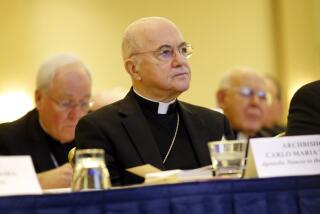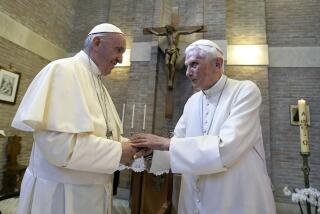To Some, the Pontiff Was a Divisive Figure
VATICAN CITY â In death, John Paul II has united millions of Catholics in an outpouring of grief, but in life, the pope was often a polarizing figure.
As the late pontiff is eulogized for his profound personal piety and globe-spanning charisma, voices of dissent serve as reminder that the church today is sharply divided and uncertain about its future.
âThe credibility of the Catholic Church has been left in a true crisis,â said Hans Kueng, a Swiss-born liberal theologian who was one in a long line disciplined by John Paul, and for whom the end of this 26-year papacy represents potential liberation.
Critics say the pope stifled internal democracy and resisted the forces of modern change that many of his followers desired. He cleaved strictly to conservative theological doctrine and ruled the church with a firm hand, centralizing power at the Vatican and stripping much autonomy from local dioceses.
One result, say the critics: The number of practicing Catholics has declined in many parts of the world, including traditionally Roman Catholic countries such as Spain and Italy, where his stance on so-called lifestyle issues, including unyielding bans on abortion and birth control, alienated many people.
As far as John Paul was concerned, he was enforcing Godâs absolute truths and providing moral clarity to his church and its flock.
âWe see a mixed bag,â American nun Maureen Fiedler said in a telephone interview from Maryland, where she leads an interfaith discussion program and works for the Quixote Center, which promotes church reform. She praised John Paulâs opposition to the death penalty and his concern for the poor. But, she said, âhis failure to apply the norms of peace and social justice within the church is what troubles us.â
John Paul was reared, spiritually and philosophically, in the conservative Polish Catholic Church, an institution under siege from Nazism and, later, four decades of communism.
The change promulgated by the Second Vatican Council in the mid-1960s never found their full expression in the underground Polish church.
Many Catholics around the world thought the changes brought by the Second Vatican Council were the harbinger of reform and an advent, however tentative, of more democratic thought. âVatican II,â as it became known, decreed that Mass could be said in languages other than Latin and that the priest could face the congregation, reversing a thousand-year-old practice. It also sought to improve relations with other religions, especially other Christian denominations.
Although John Paul formally embraced Vatican II, he also believed it did not substantially change the church. His tenure saw a return to several more medieval traditions; he named more saints than all his modern-era predecessors put together and encouraged the practice of exorcism because he regarded Satan as a real and conniving presence.
âMany people are now hoping for a pope who will seriously free up the logjam of reforms which has been mounting since the Second Vatican Council and have the courage to make a new start,â Kueng, the Swiss theologian, said in a statement released after the popeâs death Saturday.
Kueng was stripped of his license to teach Catholic theology in 1979 after the Vatican found fault with his view on papal infallibility. He declined a request for an interview this week but has said in the past that the popeâs rigid stands drove millions to abandon the church or âturn inward.â
The popeâs extraordinary willingness to reach out to the public and build bridges to diverse communities, to Jews, Muslims and the developing world, critics say, did not always extend to his own church.
âNo matter how you evaluate this pontificate, the fact is, the Catholic Church today is significantly polarized in a way it wasnât 26 years ago, between conservatives and liberals, left and right,â said the Rev. Keith Pecklers, a theologian at the Pontifical Gregorian University in Rome.
âThe next pope will have to have at the top of his agenda somehow healing the rift ... by listening to all sides,â he said.
Especially in the West, the sharpest divergences include issues such as the ordination of female priests. Although he often wrote and spoke about the dignity of women and held the Virgin Mary in exalted reverence, John Paul declared, in a May 1994 apostolic letter, that women could not become priests, and he closed the door on further discussion.
The church, he wrote, âhas no authority whatsoeverâ to ordain women, and âthis judgment is to be definitively held by all the churchâs faithful.â
In parts of the developing world and elsewhere, critics complain that the Vatican muzzled liberal theologians, muted academic freedom, and replaced local bishops who did not toe the line with prelates more to John Paulâs own philosophical liking.
âThe intellectual effervescence that came from Vatican II was lost, and we entered a period of stagnation,â said a Jesuit scholar who did not want to be quoted by name. âHe did so many wonderful things, but Catholic intellectual life was left in shambles.â
The Jesuits ran up against John Paulâs penchant for centralizing authority early in the pontificate. He was seen as having usurped 400 years of Jesuit self-rule when he appointed a personal delegate to rule the activist order in 1981, admonishing its members to conduct theological research âin docile harmony with the directives of the magisterium.â
But the Rev. Paul Mankowski, a conservative Jesuit, said disagreements that members of his order had with the pope were misguided.
âThe venom of liberals toward Karol Wojtyla was bitterest, ironically, in precisely that area in which he differed least from his predecessors and in which his successor will differ least from him: in repeating the truism that doctrine, being unchangeable, will not be changed,â Mankowski wrote in Catholic World Report.
No member of the church elite is willing to criticize the pope openly at this point. But subtle suggestions have begun to emerge from a number of cardinals that the future of the church must incorporate more flexibility.
âWe cannot kill people with morality,â Cardinal Lubomyr Husar of Ukraine said in an interview. âA pastor is the one who can make morality enjoyable.... Vatican II was all about speaking to people in ways they can understand.â He added that John Paul lived the spirit of Vatican II âin his way.â
Cardinal Edmund Casimir Szoka, a Polish American from Michigan, said it was a mistake to characterize the pope as inflexible.
âI think he was enunciating very clearly the teachings of the church,â Szoka said in an interview. âNow, some people donât want to hear that. But that doesnât make him inflexible. Maybe that makes them inflexible.â
Fiedler and dissidents interviewed said they hoped the next pope would change the direction of the church, toward less centralization and more grass-roots democracy, but they were not optimistic. Without a thriving forum for dissent, she said, the church cannot make progress and grow.
âThe church is an authoritarian political structure. There are no democratic structures to promote other views,â Fiedler said. âHow do you make headway without dissent?â
Times staff writer Richard Boudreaux contributed to this report.
More to Read
Sign up for Essential California
The most important California stories and recommendations in your inbox every morning.
You may occasionally receive promotional content from the Los Angeles Times.











